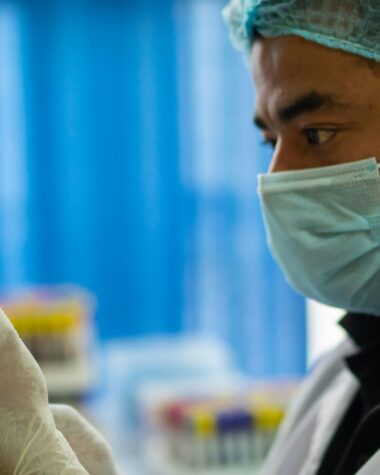Pyxis Oncology Inc. (NASDAQ:PYXS) is a clinical-stage biotechnology company committed to redefining the landscape of cancer therapy through the development of next-generation antibody-drug conjugates (ADCs). Founded in 2019 and headquartered in Boston, Massachusetts, Pyxis was created with a clear vision: to design smarter, more precise cancer treatments that maximize tumor-killing power while minimizing harm to healthy tissues. The company’s mission is rooted in delivering transformative therapies for patients with difficult-to-treat solid tumors, where existing treatment options are often limited and survival outcomes remain poor.
Pyxis emerged with strong scientific pedigree and industry backing, having been incubated by Longwood Fund and launched with key intellectual property licensed from Pfizer. The company rapidly built a robust ADC platform focused on creating targeted therapies that improve upon traditional chemotherapy by linking potent cytotoxic payloads to tumor-specific antibodies. This targeted approach is designed to deliver powerful anti-cancer agents directly to the tumor microenvironment, thus enhancing efficacy and reducing off-target effects.
The company’s lead candidate, PYX-201 (also known as micvotabart pelidotin), is an investigational ADC that targets the tumor stroma—a critical component of the tumor microenvironment believed to play a key role in treatment resistance and disease progression. PYX-201 is currently in clinical development for recurrent and metastatic head and neck squamous cell carcinoma (HNSCC), a patient population with high unmet medical need. The program has already earned Fast Track Designation from the U.S. FDA, reflecting its potential to address serious medical conditions more efficiently through expedited development and review processes.
Since inception, Pyxis has demonstrated its ability to operate with strategic discipline. The company has made deliberate decisions to focus its pipeline on the most promising clinical opportunities, including the recent decision to suspend further development of PYX-106 and consolidate resources around PYX-201. This concentrated focus allows the company to optimize its operational execution and conserve cash while still advancing a potentially best-in-class therapy.
Despite operating in the capital-intensive biotech sector, Pyxis maintains a strong financial position, bolstered by $146 million in cash and equivalents as of the most recent reporting period. This provides the company with a financial runway that extends into the second half of 2026—ample time to reach critical clinical data readouts for PYX-201, both as a monotherapy and in combination with checkpoint inhibitors like Merck’s KEYTRUDA® (pembrolizumab).
As one of the few biotech companies operating at the intersection of precision oncology and advanced drug delivery, Pyxis Oncology is uniquely positioned to contribute to the next wave of cancer innovation. Its science-driven, patient-focused approach, combined with operational agility and strategic clarity, makes it a compelling name to watch in the ADC space. For investors, analysts, and clinicians alike, Pyxis Oncology represents a high-potential story anchored in cutting-edge science and poised for inflection as its lead asset progresses through clinical development.
Strategic Focus on PYX-201: A Best-in-Class Tumor Stroma-Targeting ADC
The centerpiece of Pyxis Oncology’s clinical ambitions is PYX-201, an investigational tumor stroma-targeting ADC designed to treat head and neck squamous cell carcinoma (HNSCC). PYX-201 has received Fast Track Designation from the FDA, a significant regulatory milestone that expedites the drug development and review process for candidates targeting serious conditions with unmet medical needs.
Pyxis is exploring PYX-201 in two formats: as a monotherapy and in combination with Merck’s KEYTRUDA® (pembrolizumab). This dual-pronged approach allows Pyxis to validate both the standalone efficacy and potential synergy with existing checkpoint inhibitors—an important consideration given the complex immunosuppressive tumor microenvironment in HNSCC.
In light of encouraging Phase 1 data, Pyxis recently announced it would halt investment in PYX-106, an immuno-oncology program, and concentrate entirely on advancing PYX-201. This move reflects a disciplined approach to capital allocation and a strong belief in the transformative potential of its lead asset. By shedding peripheral programs and consolidating efforts around PYX-201, Pyxis is sending a clear message to the market: it is going all-in on a high-value opportunity.

CHECK THIS OUT: Johnson & Johnson (JNJ) can be the Next Trillion-Dollar Stock and Boston Scientific (BSX) Just Signed a $45M Deal—Here’s What It Means for Investors.
Data-Driven Catalysts Expected to Define 2025–2026
According to Jefferies, Pyxis Oncology is expected to deliver multiple high-impact clinical data events in the second half of 2025 through the first half of 2026. These include readouts from ongoing trials evaluating PYX-201 in both monotherapy and combination regimens. The data will not only determine the therapeutic viability of PYX-201 but also benchmark its performance against rival candidates from companies like MRUS (Merus) and BCAX (BioCancell Therapeutics)—both of which are anticipated to release mature datasets during the same timeframe, likely at major medical conferences such as ASCO 2025.
Despite lowering their price target from $12 to $6, Jefferies maintained a Buy rating, citing the strength of Pyxis’s focused strategy, upcoming catalysts, and regulatory momentum. This reflects a broader Wall Street sentiment that sees current prices as undervaluing the company’s clinical and strategic positioning.
Financial Position: Deep Liquidity and Extended Runway
One of the most compelling aspects of the Pyxis bull case is its financial strength. With approximately $146 million in cash and cash equivalents on the balance sheet, the company is capitalized to fund operations into the second half of 2026. This extended runway is rare among clinical-stage biotechs and allows Pyxis to navigate multiple data cycles without the immediate pressure of capital raises or dilution.
The company boasts a current ratio of 7.33, indicating exceptional short-term financial health and the ability to meet all near-term obligations with ease. According to InvestingPro analysis, Pyxis holds more cash than debt—a positive signal for risk-conscious investors. While the company is burning cash to fuel its trials, the leaner operational focus and elimination of secondary programs have helped preserve capital for the most value-accretive work: progressing PYX-201 toward late-stage validation.
Analyst Support Continues Despite Market Volatility
The bullish outlook is reinforced by multiple Wall Street analysts who continue to back the stock with strong ratings and revised—but still optimistic—price targets. In addition to Jefferies’ $6 valuation, H.C. Wainwright maintains a Buy rating with a $5 target, while RBC Capital rates the stock Outperform, projecting an upside to $8. These ratings reflect confidence in the clinical relevance of PYX-201 and trust in management’s capital discipline and execution.
Even amid macroeconomic pressures and broader biotech sector weakness, analysts remain constructive on Pyxis’s prospects, particularly given the attractive valuation and upcoming clinical catalysts that could re-rate the stock significantly in 2025 and beyond.
Positioning for a Rebound in the ADC Revolution
The broader ADC market is experiencing a resurgence, thanks to improved payload technologies, targeted delivery systems, and growing validation from large pharmaceutical players. Companies like ImmunoGen and Seagen have proven that ADCs can generate blockbuster drugs—and Pyxis is aiming to follow suit. By focusing on the tumor stroma, PYX-201 may address one of the key mechanisms of resistance in solid tumors and offer durable clinical benefit.
Pyxis’s ability to secure Fast Track Designation for PYX-201 signals FDA alignment with its therapeutic strategy. The stroma-targeting mechanism, combined with rational combination approaches, positions PYX-201 to become a potentially disruptive therapy in HNSCC—a disease with few breakthrough options in recent years.
Conclusion: A High-Conviction, Undervalued Clinical-Stage Biotech
Pyxis Oncology is a high-risk, high-reward clinical-stage biotech stock that is rapidly gaining credibility due to its focus, financial prudence, and strategic execution. With a single but promising ADC candidate in the spotlight, a strong cash position, and multiple upcoming data catalysts, PYXS represents an asymmetric opportunity for investors willing to anticipate long-term clinical success.
The recent price action suggests the stock may be bottoming, and if PYX-201 delivers on even a portion of its therapeutic promise, the upside from current levels could be substantial. For investors looking for an undervalued play in the immuno-oncology and ADC space with a clear roadmap to value realization, Pyxis Oncology deserves serious attention heading into 2025.
READ ALSO: This Tiny Surgical Robot Stock Could Disrupt a $30 Billion Industry: Microbot Medical (MBOT) and Pro-Dex (PDEX) Plunges 39% – Here’s Why Smart Investors Are Buying the Dip.








